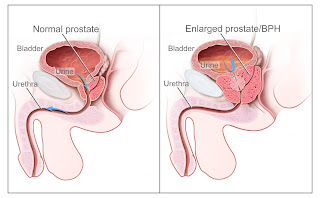The second bit of good news regards screening and diagnosis of prostate cancer. Cancer Research UK scientists in Cambridge have moved a step closer to developing a simple urine test to show which men are at higher risk of developing prostate cancer.
The story got a lot of media coverage but much of it confused screening with diagnosis, and failed to give enough detail on how effective the test was.
What the researchers have shown is that 30-40% of men of European origin, carry a genetic variant that places them at increased risk of developing prostate cancer. This variant can be picked up in a urine test, which could be done in early adulthood. The lead researcher Dr Hayley Whitaker told me that carrying the variation increases a man's likelihood of getting prostate cancer by 13%.
Of course just having the variant doesn't mean you will get prostate cancer, just as not having the variant doesn't mean you won't get it. So the screening test is of limited value.
Now for diagnosis. The CRUK researchers looked at levels of a protein found in urine called MSMB. They showed that men with prostate cancer are likely to have low levels of MSMB. In a small study they were able to diagnose prostate cancer from urine samples with about 50% accuracy.
That may not sound very precise, but it's twice as accurate as the current method, a blood test which measures levels of PSA protein. That test is accurate in just one in four cases, meaning many men undergo unnecessary biopsies.
The urine test would cut the number of wrong diagnoses, but it would not get rid of them altogether. A trial of 1,200 men is due to finish by Christmas and further studies will be carried out. Perhaps combining the tests, looking for both PSA and MSMB levels, will increase the accuracy.
Talk of a universal screening programme for prostate cancer is premature. Both the screening and the diagnostic tests are flawed, but they are nonetheless steps in the right direction for a condition that gets limited attention and funding compared to breast cancer.
What Is prostate cancer?
Prostate cancer is the uncontrolled growth of abnormal cells in the prostate gland, a gland near the base of the penis that produces part of the fluid in semen.
Prostate cancer is common, but not always dangerous. When cells in the prostate become cancerous (malignant), they first form small islands of cancer that are confined to the prostate. This localized form of cancer affects about one-third of men as they grow older. In many cases, it takes years, or even decades, for this limited cancer to grow beyond the prostate gland's tough outer capsule.
If cancer grows beyond the prostate gland, it may invade surrounding parts of the bladder and urethra, causing problems with urination. The cancer also may spread to nearby lymph nodes, or to the bones, liver or rectum. Prostate cancer that has spread to lymph nodes or other organs usually cannot be cured, although they often can be kept under control for a number of years with medical therapy.
Article Source :
Image Source :

No comments:
Post a Comment